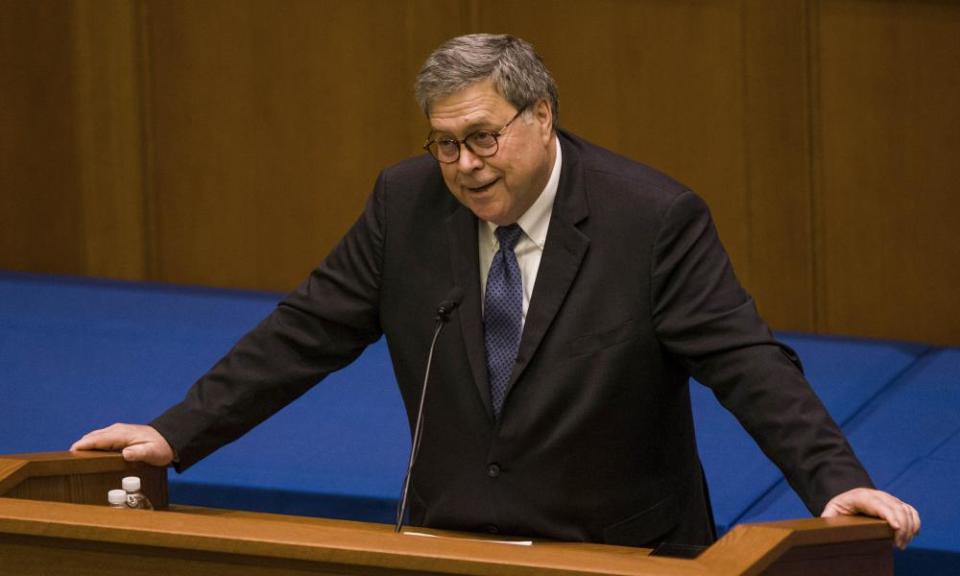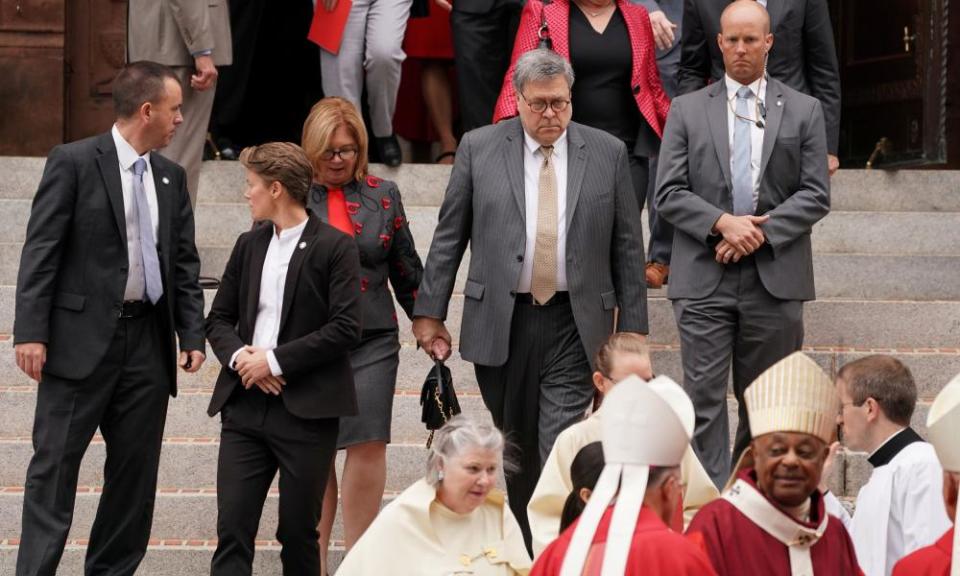'A threat to democracy': William Barr's speech on religious freedom alarms liberal Catholics
Prominent liberal Catholics have warned the US attorney general’s devout Catholic faith poses a threat to the separation of church and state, after William Barr delivered a fiery speech on religious freedom in which he warned that “militant secularists” were behind a “campaign to destroy the traditional moral order”.
The speech last Friday at the University of Notre Dame law school, in which Barr discussed his conservative faith and revealed how it affects his decision-making as the nation’s chief law-enforcement officer, has set off a fierce debate among Catholic intellectuals from across the political spectrum, as well as among Catholics inside the justice department.
C Colt Anderson, a Roman Catholic theologian and professor of religion at Jesuit-run Fordham University, said in an interview that he was unaware until this week that Barr was a fellow Catholic. Now, after reading the speech, Anderson believes the attorney general, in revealing his devotion to an especially conservative branch of Catholicism, is a “threat to American democracy”.
He described the speech as a “dog whistle” to ultra-conservative Catholics who, he says, have aligned themselves to Donald Trump in a campaign to limit the rights of LGBTQ Americans, immigrants and non-Christians, especially Muslims, and to criminalize almost all abortions. “The attorney general is taking positions that are essentially un-Democratic” because they demolish the wall between church and state, Anderson said.
Related: US justice department resumes use of death penalty and schedules five executions
In the hallways of the justice department in Washington, there has been a similar furor among some Catholics employees who answer to Barr. “I was shocked by the speech and all this fire and brimstone,” said a senior department career official who considers himself a devout Catholic, speaking on condition that he not be identified for fear of losing his job.
“At least it helps me understand why Barr has been so willing to put his own reputation on the line to defend Trump so fiercely in every battle,” beginning with the congressional investigation that is likely to end in the president’s impeachment, he said. “Trump is Barr’s imperfect vessel in serving a much higher cause: the gospel.”
In the speech, delivered to an invitation-only crowd at Notre Dame, one of the nation’s largest and best known Catholic universities, the attorney general described threats to religious freedom.

He warned that Catholicism and other mainstream religions were the target of “organized destruction” by “secularists and their allies among progressives who have marshalled all the force of mass communications, popular culture, the entertainment industry and academia”.
He insisted that “the traditional Judeo-Christian moral system” of the United States was under siege by “modern secularists” who were responsible for every sort of “social pathology”, including drug abuse, rising suicide rates and illegitimacy.
Barr did not address the fact that many of the policies of the Trump administration are strongly opposed by the Vatican. Pope Francis has repeatedly pleaded for the United States to open its doors to more refugees, even as Barr has defended policies that turn away or imprison immigrants seeking refugee status at the US-Mexico border, even separating parents from their children.
The reaction to Barr’s address came as another Trump cabinet member, secretary of state Mike Pompeo, was drawing fire from civil liberties groups over the state department’s decision this week to promote his recent speech titled Being a Christian Leader on the department’s online homepage.
The speech by Pompeo, an evangelical Christian, was delivered on Friday, the same day as Barr’s speech, to a meeting of the American Association of Christian Counselors in Nashville.
“It’s perfectly fine for secretary Pompeo to be a leader who is a Christian,” the group Americans United for Separation of Church and State said in a statement. But the decision to promote Pompeo’s speech on the department’s official website sends “the clear message that US public policy will be guided by his personal religious beliefs”.
Barr’s speech at Notre Dame was a reminder of a fact often overlooked in analysis of Trump’s political base – that while the president enjoys the support of many high-profile right-wing Christian evangelical leaders, he has also surrounded himself with conservative Roman Catholics associated with organizations that some others in the faith consider extreme.
One example: Barr and Patrick Cipollone, Trump’s White House counsel, have both served on the board of directors of a Washington-based organization staffed by priests from the secretive, ultra-orthodox Catholic sect Opus Dei.

Barr’s speech last week was hailed by many conservative religious commentators. “Barr took the gloves off, saying that religion is not jumping to its death; it’s being pushed,” wrote Ron Dreher at the American Conservative magazine.
“As we religious conservatives think about how to vote in the election next fall, we should ponder the fact that under Donald Trump, as awful as he is in so many ways, a man of William Barr’s convictions is heading up the Department of Justice,” Dreher continued. “Thank God Bill Barr is there.”
Liberal Catholics, on the other hand, said they were dumbfounded at Barr’s willingness to so publicly link his Catholicism to his work at the justice department.
“This should put the fear of God into anybody who cares about freedom, democracy and the separation of religion and politics,” said Jon O’Brien, president of Catholics for Choice, a group that advocates for Catholics who support a woman’s right to abortion and other reproductive freedoms.
Barr’s speech, he said, shows that “Christmas is coming very early” for conservative Catholics and other Christians who want to see an end to abortion rights.
In his Notre Dame speech, Barr spoke of the need for the United States to recognize “natural law”, a concept in Catholic theology that has been cited by the Vatican in recent decades to try to outlaw artificial contraception and medical procedures such as in vitro fertilization.
O’Brien said he worried that under Barr, who was sworn in last February, that the justice department could impose a de facto litmus test on federal judicial candidates, requiring them to commit themselves to “natural law”.
Anderson, the Fordham theologian, said he was so alarmed by the tone of Barr’s speech that he was now concerned the attorney general intends to use his authority to put the United States on the path of increasingly authoritarian European nations like Poland, where democratically government leaders have cited their devout Catholicism to justify a crackdown on free speech and the purging of judges.
That Barr is a devout, conservative Catholic is no surprise to anyone who has studied his writings and speeches. In a 1995 article in Catholic Lawyer magazine, Barr, who had previously served as attorney general under George H W Bush, warned that “we are living in an increasingly militant secular age” and that Catholic lawyers should “take the battlefield and enter the struggle” in support of laws “designed to restrain sexual immorality, obscenity or euthanasia”.
The article denounced the “evil” of abortion and bemoaned the rise of the gay rights movement. “How can it be that the homosexual movement, at one or two percent of the population, gets treated with such solicitude while the Catholic population, which is over a quarter of the country, is given the back of the hand?” he wrote.
But in his Senate confirmation hearings in January, Barr was asked few questions about his faith and how it might bear on his actions on the Justice Department.
Barr was not questioned in any detail, for example, about his membership on the board of directors of the Catholic Information Center in Washington, the Opus Dei-linked group that offers as a meeting place for prominent Catholics in the capital.
The center’s board has also included Leonard Leo of the Federalist Society, the right-wing legal group tasked by Trump to help him pick federal judges, including members of the supreme court. Leo led campaigns to support of the supreme court nominations of John Roberts, Samuel Alito and Brett Kavanaugh, all of them Catholics, who now serve on the court.
Related: The anti-abortion conservative quietly guiding Trump's supreme court pick
A week later, Barr’s speech at Notre Dame remains the subject of “a lot of chatter” on campus, said professor David Campbell, chairman of the university’s political science department.
Campbell said in an interview that he was reluctant to be drawn into the debate about Barr’s religious views, although he suggested that the attorney general was wrong in one of his central arguments: that so-called secularists, a term generally applied to people who want a strict separation between church and state, were a threat to the freedom of Catholics or others to worship as they please.
In fact, Campbell, who is just about to publish a book on the subject, said that opinion polls and other reliable scientific research showed that Americans who describe themselves as secularists are “quite supportive of the free exercise of religion, particularly when it comes to minority religions”. The attorney general and other conservative Catholics might believe that secularists are some sort of threat to their religious freedom, Campbell said, “But, the truth is, it’s a myth.”

